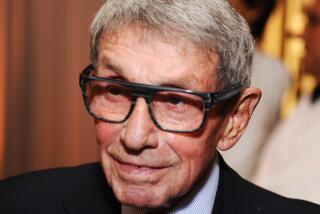Brando a Hard Act to Follow : Father and son: Failure plagued the life of young Christian, who never emerged from the shadow of the famous actor.
- Share via
Christian Brando has plied a few trades while living in the shadow and the gated, sumptuous home of his famous actor father.
A high school dropout, he learned artistic welding, attempted to start a tree trimming service and tried his hand at acting.
He prevailed at none.
Even in marriage, Marlon Brando’s oldest child, who turned 32 last week, was less than a success.
Records show that when his ex-wife, Mary McKenna Brando, refused to sign divorce papers in 1986, Christian Brando “worked himself into a rage and said, ‘You better call the police or get out of the house because I’m going to kill you if it’s the last thing I do. . . .’ ”
He had come home “many times and for no reason became enraged and started breaking furniture and throwing me across the room,” McKenna Brando said in a signed declaration to the court.
Once, in a particular moment of anger, he aimed a loaded rifle at his mother-in-law, divorce documents allege.
Such was the man Los Angeles police arrested Thursday on suspicion of having shot to death the boyfriend of his pregnant half-sister, Cheyenne Brando, 20, after a heated argument Wednesday night in the den of their father’s home.
With the exception of four traffic tickets since May, 1987, there is little to indicate that Christian Brando has ever before been in trouble with the law.
While detectives and big-time defense attorneys scrambled to explain the shooting Thursday, Christian Brando’s former sister-in-law depicted him as a “mellow, very unglamorous guy” who likes to scuba dive and collect guns, but “isn’t the kind to carry guns around.”
Even his ex-wife found it hard to believe that he had been implicated in a slaying.
“He is not a killer,” Mary McKenna Brando said in a brief telephone interview. “There must have been a reason for it. He was very protective of his sister.”
McKenna Brando would not comment on claims she made during her divorce proceedings that Brando had threatened to harm her.
Born May 11, 1958, to Marlon Brando’s first wife, Calcutta-born actress Anna Kashfi, Christian was not yet out of diapers when his celebrity parents separated and divorced. The split was hardly amicable; his parents’ fighting was regular and searing--the stuff of gossip columns.
Kashfi was awarded custody of her son. But five years later, a judge declared that her “reliance on drugs and alcohol” contributed to an uncontrollable temper often demonstrated in public, and the boy was removed. The court ordered that Christian, then 6, live with Marlon Brando’s older sister.
Marlon Brando had married twice more and had three more children by 1972, when the actor was awarded custody of Christian after a lengthy court hearing in Santa Monica. Brando enrolled him at the exclusive Ojai Valley School near Santa Barbara.
While Brando was filming “Last Tango in Paris,” Kashfi allegedly kidnaped Christian and took him to a hippie camp in Baja California, where he was eventually found, living in a drafty tent and suffering from bronchitis.
A year later, Kashfi sued to recover custody of the boy, claiming that Brando’s performance in the sexually provocative “Last Tango in Paris” had caused Christian “ridicule and embarrassment.” She dropped her lawsuit in 1974, after being assured by Brando that she would get reasonable visitation rights.
By the 11th grade, Christian had dropped out of school. Tall and thin, with brown hair and brown eyes, he kept no steady job, but continued to live at home, in Brando’s hilltop estate just west of Coldwater Canyon.
In May, 1980, records show, his father bought him a cabin on five acres in southern Washington state, an area of gentle hills with fir and cedar trees and salmon streams.
Seven months later, young Brando married Mary McKenna, a makeup artist he had met when they were 12. McKenna, also a high school dropout, ran a cosmetics shop with her sister in the 700 block of North La Cienega Boulevard. The couple separated in June, 1983. Brando sued for divorce in 1986.
During the divorce proceedings, he described his occupation as “tree service worker” and listed his monthly income at $800. His monthly expenses were listed at nearly twice that.
“(He) has never worked more than occasionally,” McKenna Brando responded in court papers. “He has never had a steady job or reliable flow of income.”
Christian’s primary source of income, she said, “consisted of running errands for his father.”
McKenna filed a declaration contending that her husband frequently was violently abusive.
“Once, when I tried to get away, he jumped on top of my car to keep me from going anywhere,” she stated. “On another occasion, (his) brother was present and even his brother was afraid to help me. Even Marlon told me that the next time (he) tried to lay a hand on me, I should call the police.”
The divorce was made final in February, 1987. Christian got to keep his two trucks, a 1984 Camaro his father had given him, the Washington state property, and a $499,000 trust fund set up by the actor when his first-born was a baby.
In October, 1987, Christian worked on his first--and apparently only--movie, playing the part of a hit man in an Italian film about the assassination of a village official.
According to the library of the Academy of Motion Picture Arts and Sciences in Beverly Hills, “there is no evidence that the film was ever released in Italy or anywhere else in the world.” It was produced under the Italian title “La Posta in Gioco,” and was called both “Up for Grabs” and “The Stakes” in English.
Christian Brando was quoted at the time as saying that his father, whom he called “Pops,” offered him a bit of advice before filming started: “Get the first three punches in. They’re the ones that count.”


